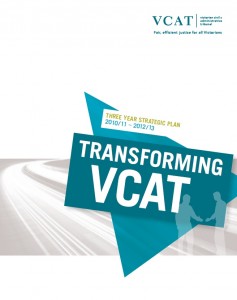Credit where it’s due. When I commented on the proposed pay-for-speed initiatives at the major cases list at VCAT last September, I argued (as did pretty much everyone) that what was really needed was extra funding across the list. VCAT is in a bad way at the moment, clearly struggling to clear its cases in a timely manner: the persistent rumour is that they lack the money to put on the Sessional Members that are needed to deal with the Planning List. And now Matthew Guy has announced what amounts to an emergency funds injection, specific to planning:
The Victorian Coalition Government has committed $1 million to tackle the backlog of planning cases before the Victorian Civil and Administrative Tribunal (VCAT).
Announcing the initiative today, Planning Minister Matthew Guy said the funding would enable approximately 800 cases to be finalised and reduce the waiting list by up to six months.
Interestingly, the press release hints at looming twelve month waiting periods, which is even worse than the eight or nine months I’ve heard of:
“Eighty per cent of cases currently on the Planning and Environment List have been waiting at least six months to be heard, and without today’s initiative were likely to wait a further six months before a hearing date was confirmed,” Mr Guy said.
Whether it’s a year or eight or nine months, the waiting times are ridiculous and make a mockery out of the various “circuit-breaking” measures that exist to allow applicants to resolve disputes or move past an intransigent council. For example, there’s no point appealing a council failure to determine an application within 60 days when VCAT are likely to be slower than the council.

